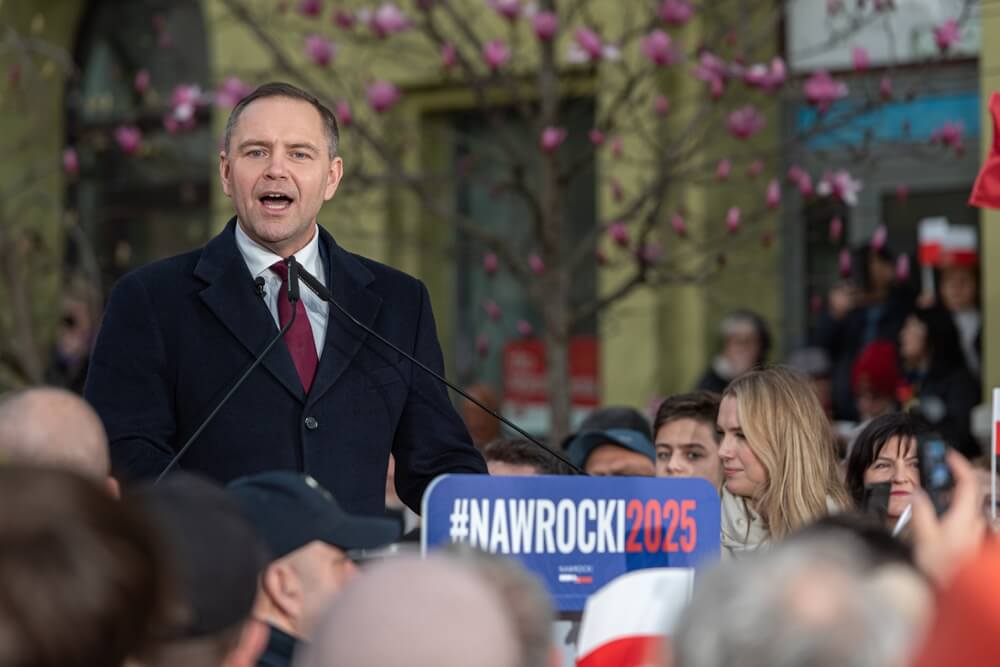Poles will decide this Sunday in presidential elections whether Poland will cement closer ties with the European Union or return to populist promises and greater nationalist prescriptions.
In the first round of elections on 25 May, Rafał Trzaskowski, the Warsaw mayor running for Prime Minister Donald Tusk’s pro-EU Civic Coalition (KO), secured a narrow victory over Karol Nawrocki of the right-wing Law and Justice (PiS) opposition party.
It remains to be seen if Trzaskowski can overturn voter disenchantment with Tusk, who has been unable to fulfil his pledge to overturn many illiberal restrictions on, for example, abortion that were enacted during eight years of PiS rule until 2023. Many reforms were blocked by the veto powers of the outgoing President Andrzej Duda of PiS.
Polls show the two presidential candidates tied, and each man must now attract enough of the almost 40% of voters who supported other, mostly far-right candidates in the first round.
“For now, Poland is a pertinent example of recovery from the populism and authoritarianism spreading across the continent,” said a European Council on Foreign Relations analysis. “The upcoming presidential election will determine how possible this trajectory is.”
Shifting alliances
On Ukraine, the two main parties differ little except over the details of how to stand up to Russia’s Vladimir Putin.
Tusk has aligned Poland with Britain, France and Germany in a grouping nicknamed the “four musketeers”. Leaders of the four countries recently travelled to Kyiv to show solidarity amid an apparent weakening of US commitment to Ukrainian security.
Tusk has aligned Poland with Britain, France and Germany but Nawrocki opposes deeper European security co-operation
This group stands in contrast to what is known as the “Visegrad four”, a political and cultural alliance between Hungary, Slovakia, the Czech Republic and more recently Poland. The first two members lean towards Moscow, while the Czech Republic may go that way after October elections.
Nawrocki opposes deeper European security co-operation and seems more inclined to seek closer security ties with the Baltics, Nordics, Britain and Romania.
He has promised that, as president, he would not ratify Ukraine joining Nato. He signed an agreement to this effect with Sławomir Mentzen, the far-right Confederation candidate who finished third in the first round of the presidential elections.
National interests
Tusk, meanwhile, opposes sending peacekeepers to Ukraine should there be a truce.
He has promised to push forward with Ukraine’s bid to join the EU as part of Poland’s current presidency of the European body.
But his condition is that Ukraine must deal with issues arising from the Second World War when Ukrainian nationalists massacred Poles.
The massacres remain a source of bitterness in Poland. Ukraine has allowed the exhumation of some Polish victims in mass graves in the Ukrainian region of Volhynia under a recent agreement reached by the two countries.
“We will help Ukraine but we will also look after our national interests” - Tusk
“We will help Ukraine but we will also look after our national interests and this is obvious to both sides,” Tusk said earlier this year while standing alongside Ukrainian President Volodymyr Zelenskyy in Warsaw.
The reach of President Donald Trump
The final election result may depend on the reach of President Donald Trump, who endorsed Nawrocki when the PiS candidate was in Washington in early May.
“President Trump said: ‘You will win’,” Nawrocki told the private broadcaster TV Republika. “I read it as a kind of wish for my success in the upcoming elections, and also awareness of it, and after this whole day I can say that the American administration is aware of what is happening in Poland.”
“The president in Poland will be elected by Poles, not Trump and not Americans” - Bartlomiej Sienkiewicz
But Trump’s endorsement may backfire given that polls show around 49% of Poles think his actions have been bad for Poland. “The president in Poland will be elected by Poles, not Trump and not Americans,” Bartlomiej Sienkiewicz, a KO member of the European Parliament, told the private broadcaster Polsat News.
Both the main candidates would like to maintain close ties with the US, which has 10,000 troops in Poland, part of a total of 85,000 US troops in Europe.
Under Tusk, Poland recently acquired from the US 400 advanced AIM-120D medium-range air-to-air missiles. Tusk also finalised an agreement with Westinghouse-Bechtel of the US for Poland’s first nuclear power plant.
Domestic and foreign policies
Much may hinge on what Poles seek in terms of domestic rather than foreign policies, given there appears broad support for high spending on defence amid the Russian threat as well as continued EU membership.
 If elected, Karol Nawrocki would probably block the government’s efforts to restore judicial independence alongside other liberal reforms
If elected, Karol Nawrocki would probably block the government’s efforts to restore judicial independence alongside other liberal reforms
Tusk is hoping for his party’s victory so he can cement reforms, including those of the judiciary. European courts have ruled that judges appointed under the PiS are illegitimate because, when it was in power, it packed the constitutional court and took control of the body that appoints judges.
If elected, Nawrocki would probably block the government’s efforts to restore judicial independence alongside other liberal reforms. He would be inclined to thwart the government at every turn in preparation for parliamentary elections in 2027.
Since the KO came to power, Poland’s international standing has improved. For example, it stood in 66th place in the World Press Freedom Index in 2002 but is now ranked 31st, although still below Jamaica and South Africa.
The rest of Europe is watching what may come next.